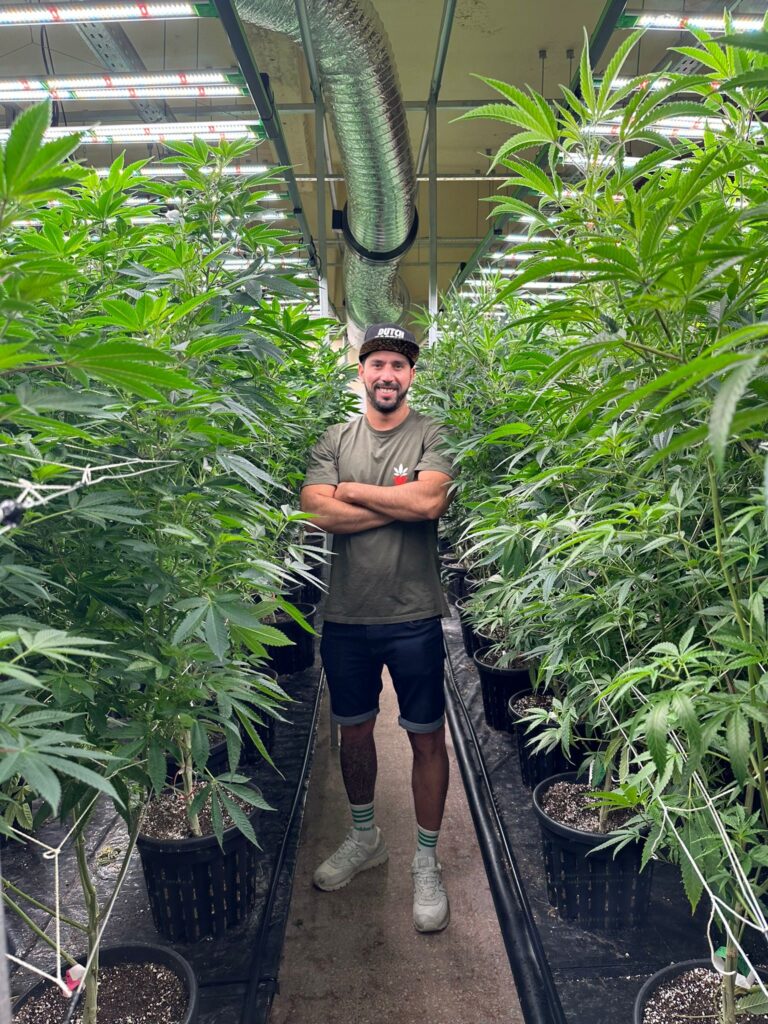Questions re-emerge about possibility of cannabis tourism in Uruguay
February 7, 2025
Uruguay’s incoming Minister and Vice Minister of Tourism, Pablo Menoni and Ana Laura Caram, have offered their perspective on legalizing cannabis tourism in the country.
On January 17, Menoni was asked at a press conference about the possibility of developing cannabis tourism in Uruguay, once the transfer of power to the recently elected left-wing Broad Front (Frente Amplio) coalition has been completed.
According to Montevideo Portal, Menoni responded that there is “margin” for this avenue to be explored, though added that it would require discussion with other government departments. Meanwhile, Caram said that the issue “must be thoroughly considered,” adding, “There is a legal framework which we need to analyze.”
Uruguay became the first Latin American country to legalize marijuana—the drug which contains the psychoactive substance THC and is derived from the dried leaves and flowers of the cannabis plant—in 2013, under the Broad Front government of José “Pepe” Mujica. Under the current law, the only people who may legally buy marijuana are people with “natural or legal citizenship, or permanent residence”.
For those who fit these criteria, marijuana can legally be acquired from pharmacies, can be home-grown for personal use, and can be obtained if the purchaser is a member of an officially recognized cannabis-producing club.
The cannabis industry already plays a significant role in Uruguay’s economy, with Statista predicting that it will achieve a revenue of $143.60 million in 2025. Of this, medical cannabis is expected to generate the largest share at $73.62 million, followed by recreational cannabis, which is projected to bring in $60.29 million.
Now, some in the industry hope the new government will further expand the market by opening it up to tourists, offering potential economic benefits to both businesses and the country.
The debate surrounding cannabis tourism is not a new one.
Former ministers of tourism, belonging to both the Broad Front and President Luis Lacalle Pou’s recent governing coalition, have previously rejected or criticized the possibility of cannabis tourism.
In 2017, Liliam Kechichián, the Broad Front’s then-Minister of Tourism, told crónicas: “There is not and there will not be cannabis tourism in Uruguay.” Seven years later, she revealed that she had changed her mind, describing cannabis as one of the “various things” which Uruguay has to offer to visitors.
In 2022, Broad Front politician Eduardo Antonini proposed a bill that would allow non-resident foreigners to purchase cannabis. While the then-Minister of Tourism under Lacalle Pou, Tabaré Viera of the Colorado Party, said that cannabis “should not be a touristic product” as it “would have more drawbacks than benefits,” he did acknowledge that it would be “convenient to enable visitors to have the same rights as Uruguayans.”
Meanwhile, the then-Undersecretary of the Presidency, Rodrigo Ferrés of the National Party, told El Observador that he did not see the bill as “feasible” and was in need of being “studied very carefully.” He added that the bill would require a “very large consensus across society and all stakeholders”.
The bill was not passed.
Nicolás Morales, the director of Indajaus, told Latin America Reports that the topic of cannabis tourism re-emerges each time a new government takes office.

Indajaussells the products needed for cannabis cultivation, which include seeds and fertilizers, to a variety of groups such as small-scale growers, cannabis shops, cannabis clubs, amongst others. The company primarily operates in Uruguay, but has recently begun an expansion process into Argentina and Brazil.
Morales explained that legalizing cannabis tourism would bring “various opportunities” such as creating jobs and attracting tourists interested in trying cannabis products, “similar to how someone might visit a country to try a good wine, or any other product that a country specializes in.”
However, he added that companies like Indajauscould be affected “negatively” if such a law were to only allow industrial companies, such as those which currently provide cannabis to pharmacies, to supply the product to tourists, rather than opening the market up to a wider range of businesses.
Morales also highlighted the importance of “regulating all channels” in order to avoid “strengthening the black market”. He explained that, were tourists only legally able to buy cannabis from pharmacies for example, they may be driven to buy “higher quality” products from other sources. He continued: “Therefore, one of the biggest challenges in my opinion, would be to regulate all channels of distribution not just one,” adding, “If you allow tourists to consume cannabis in the country, it shouldn’t be through just one sales channel. Otherwise, the black market will continue to thrive in the other channel.”
With the arrival of theBroad Front coalition, Morales believes there is some optimism in the cannabis industry that cannabis tourism could be legalized. This, he explained, is in part due to the fact that the Broad Front “tends to be more open minded, or more attentive” to the topic of cannabis, particularly given it was the Broad Front which legalized cannabis consumption for Uruguayans.
He suggested that the Broad Front “should feel somewhat responsible for reviewing the law they created” given that it was passed twelve years ago, in which time there have been “no substantial revisions of the law or regulations.”
Lorenzo Castaño Guigou, the CEO of Green Hemp Uruguay, told Latin America Reports about how the introduction of cannabis tourism could benefit his company, which sells products containing the non-psychoactive substance Cannabidiol (CBD).

Currently, the company does not sell CBD products to anyone in Uruguay, and instead exports them. Castaño explained that this is because Uruguay does not allow the “internal commercialization of CBD flowers,” but only that of some derived products such as oils.
These products, which may be commercialized internally, must undergo the “bureaucratic” and “expensive” process of regulation by the Ministry of Public Health. Castaño added that, while it is legal to sell oils and CBD derivatives in Uruguay, “the profits are not as good due to the high manufacturing and labor costs.”
Castaño is hopeful that, were cannabis tourism to be legalized, it would become easier for companies such Green Hemp Uruguayto make sales within Uruguay.
He added: “I think one thing will lead to another.”
He also explained that having a legal framework within which tourists will be able to purchase marijuana and other cannabis products would “improve the quality of the product” and be healthier for the tourists who currently purchase products illegally. He also stated that allowing tourists to purchase marijuana through legal routes would reduce the risk of consumption of dangerous bacteria and fungi.
Describing cannabis tourism as a “reliable way” to boost the country’s economy, Castaño explained that “Uruguay is a country that attracts many tourists, but mainly in summer, only in the beach areas,” suggesting that cannabis-based sales could help to boost tourism-generated income elsewhere and at other times of year. Specifically, he imagines that the legalization of touristic marijuana consumption could increase revenue for businesses such as restaurants and hotels.
Castaño particularly believes that the “interior” of the country, a term used to describe Uruguay’s vast rural areas, has “a lot to offer to tourists.”
However, he also noted that measures would have to be implemented in order to ensure “responsible consumption,” including the designation of areas in which tourists may consume marijuana legally, without disturbing children, locals, or other tourists.
BE GANJAH began as a Uruguay-based cultivator of CBD flowers, which it exported from Uruguay to European countries. Now, it also helps other producers, of both CBD and THC flowers, to sell their products through the company’s commercial channels.
Mónica Nicolás Lozano, the company’s CEO and co-founder, says that a law legalizing cannabis tourism in Uruguay would allow BE GANJAH to “diversify.” Currently, like Green Hemp Uruguay, the business “is based 100% on exports,” adding that “cannabis tourism could allow us to create business within our own country of production.”

Speaking about the potential advantages for Uruguay’s economy, she said a law allowing cannabis tourism could “generate industry.” She suggested that “recreational spaces” where cannabis users “can enjoy nature” or “listen to music” could be made “economically profitable” and “provide an additional sector to the Uruguayan economy.”
Nicolás believes Uruguay is currently “missing a big opportunity,” explaining that, while it was one of the first countries to legalize cannabis consumption, it failed to generate industry. “For a country to position itself in a sector,” she added, “it’s not just about legalizing, it’s also about helping to generate business,” something which she says Uruguay has failed to do thus far.
In September 2024, Bloombergreported the struggles experienced by Uruguay-based cannabis companies, with major cannabis producers and service providers such as Pharmin, Global Cannabis Holdings, and Boreal all closing their businesses in the space of 18 months. At the time of Bloomberg’s reporting, cannabis exports from Uruguay since 2018 had amounted to less than $30 million, and the country’s cannabis industry employed only 750 people. Uruguay is home to approximately 3.4 million people, with the employment rate at 58.3% as of April 2024.
Nicolás added that Uruguay has always “stood out for being innovative” in its approach to cannabis, and that legalizing cannabis tourism could allow it to become a “pioneer in the legalization of cannabis tourism.”
Search
RECENT PRESS RELEASES
Related Post


